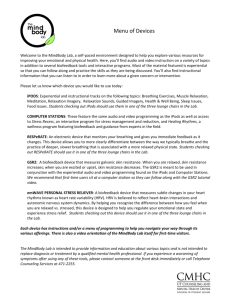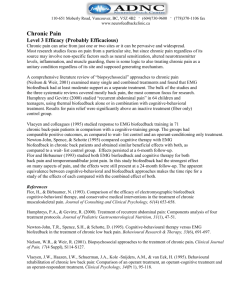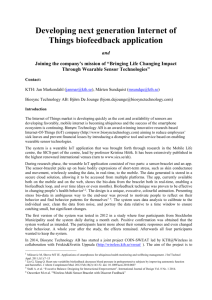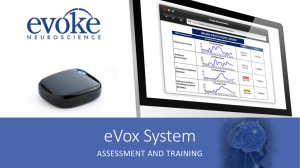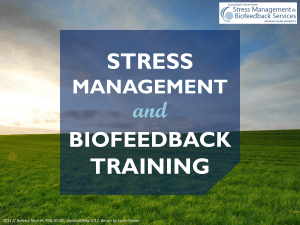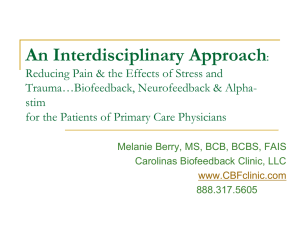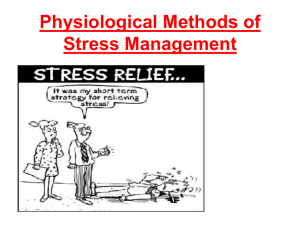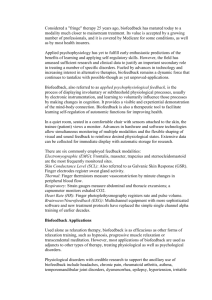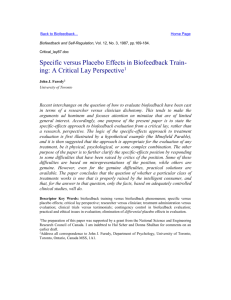Hypertension Efficac.. - ADNC Neurofeedback Centre of BC
advertisement
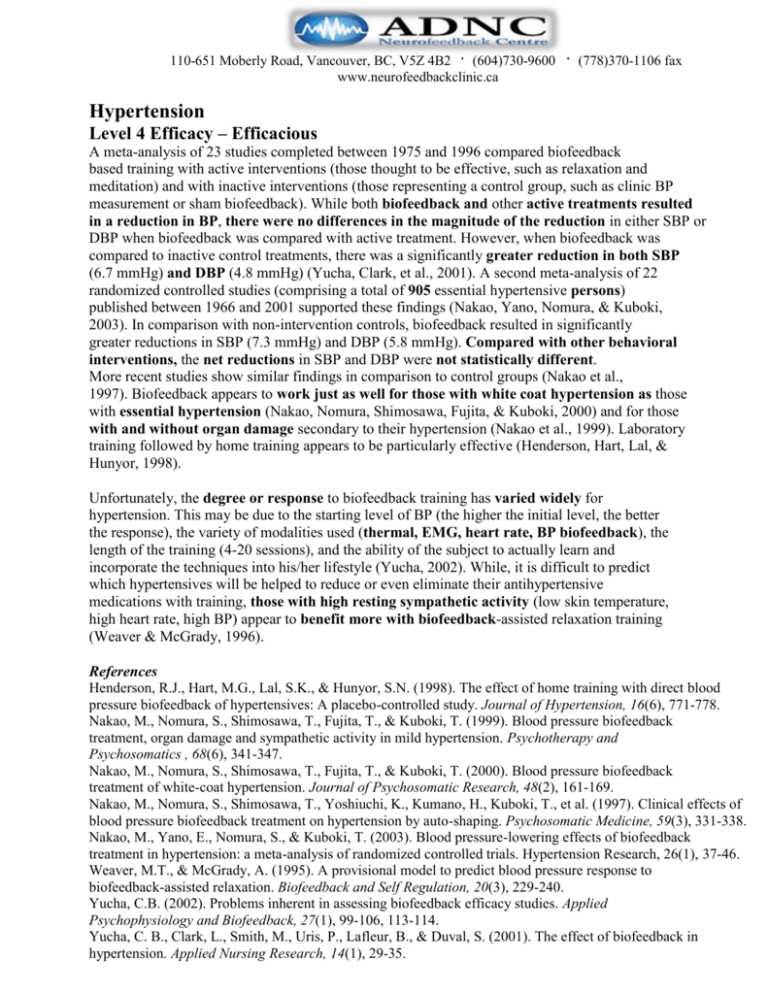
110-651 Moberly Road, Vancouver, BC, V5Z 4B2 · (604)730-9600 · (778)370-1106 fax www.neurofeedbackclinic.ca Hypertension Level 4 Efficacy – Efficacious A meta-analysis of 23 studies completed between 1975 and 1996 compared biofeedback based training with active interventions (those thought to be effective, such as relaxation and meditation) and with inactive interventions (those representing a control group, such as clinic BP measurement or sham biofeedback). While both biofeedback and other active treatments resulted in a reduction in BP, there were no differences in the magnitude of the reduction in either SBP or DBP when biofeedback was compared with active treatment. However, when biofeedback was compared to inactive control treatments, there was a significantly greater reduction in both SBP (6.7 mmHg) and DBP (4.8 mmHg) (Yucha, Clark, et al., 2001). A second meta-analysis of 22 randomized controlled studies (comprising a total of 905 essential hypertensive persons) published between 1966 and 2001 supported these findings (Nakao, Yano, Nomura, & Kuboki, 2003). In comparison with non-intervention controls, biofeedback resulted in significantly greater reductions in SBP (7.3 mmHg) and DBP (5.8 mmHg). Compared with other behavioral interventions, the net reductions in SBP and DBP were not statistically different. More recent studies show similar findings in comparison to control groups (Nakao et al., 1997). Biofeedback appears to work just as well for those with white coat hypertension as those with essential hypertension (Nakao, Nomura, Shimosawa, Fujita, & Kuboki, 2000) and for those with and without organ damage secondary to their hypertension (Nakao et al., 1999). Laboratory training followed by home training appears to be particularly effective (Henderson, Hart, Lal, & Hunyor, 1998). Unfortunately, the degree or response to biofeedback training has varied widely for hypertension. This may be due to the starting level of BP (the higher the initial level, the better the response), the variety of modalities used (thermal, EMG, heart rate, BP biofeedback), the length of the training (4-20 sessions), and the ability of the subject to actually learn and incorporate the techniques into his/her lifestyle (Yucha, 2002). While, it is difficult to predict which hypertensives will be helped to reduce or even eliminate their antihypertensive medications with training, those with high resting sympathetic activity (low skin temperature, high heart rate, high BP) appear to benefit more with biofeedback-assisted relaxation training (Weaver & McGrady, 1996). References Henderson, R.J., Hart, M.G., Lal, S.K., & Hunyor, S.N. (1998). The effect of home training with direct blood pressure biofeedback of hypertensives: A placebo-controlled study. Journal of Hypertension, 16(6), 771-778. Nakao, M., Nomura, S., Shimosawa, T., Fujita, T., & Kuboki, T. (1999). Blood pressure biofeedback treatment, organ damage and sympathetic activity in mild hypertension. Psychotherapy and Psychosomatics , 68(6), 341-347. Nakao, M., Nomura, S., Shimosawa, T., Fujita, T., & Kuboki, T. (2000). Blood pressure biofeedback treatment of white-coat hypertension. Journal of Psychosomatic Research, 48(2), 161-169. Nakao, M., Nomura, S., Shimosawa, T., Yoshiuchi, K., Kumano, H., Kuboki, T., et al. (1997). Clinical effects of blood pressure biofeedback treatment on hypertension by auto-shaping. Psychosomatic Medicine, 59(3), 331-338. Nakao, M., Yano, E., Nomura, S., & Kuboki, T. (2003). Blood pressure-lowering effects of biofeedback treatment in hypertension: a meta-analysis of randomized controlled trials. Hypertension Research, 26(1), 37-46. Weaver, M.T., & McGrady, A. (1995). A provisional model to predict blood pressure response to biofeedback-assisted relaxation. Biofeedback and Self Regulation, 20(3), 229-240. Yucha, C.B. (2002). Problems inherent in assessing biofeedback efficacy studies. Applied Psychophysiology and Biofeedback, 27(1), 99-106, 113-114. Yucha, C. B., Clark, L., Smith, M., Uris, P., Lafleur, B., & Duval, S. (2001). The effect of biofeedback in hypertension. Applied Nursing Research, 14(1), 29-35.
